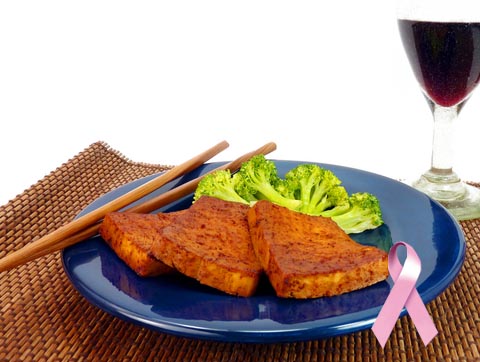
10 FOODS & Supplements to Help Prevent Breast Cancer
It's official, and has been for years...
Diet is the most effective way to reduce the risk of developing breast cancer!
Following is a listing of 10 of the most powerful food sources for breast health:
1. Cruciferous vegetables:
Don't skimp on the brocolli, Brussel sprouts, cauliflower or cabbage.These food are the cruciferous vegetables which contain indoles (sulfurus compounds). Indoles (I3C in supplement form) eliminate estrogen from the body. According to Gaynor, author of Dr. Gaynor's Cancer Prevention Program (Kensington Books, 1999), only cruciferous vegetables are known to convert estrogen in the body from cancer-promoting forms to forms that actually protect against breast cancer. One particular indole, indole-3-carbinol (13C), inhibits the development of potentially cancerous cells in the breast.
2. Seaweeds:
Eat kelp and nori regularly. Also supplementation with spirulina (1 heaping teaspoon) and chlorella (3 g) in a glass of water or juice every day. Kelp, chlorella, and spirulina contain chlorophyll. Studies have shown chlorophyll contain anti-carcinogenic effects, as well as vitamin C and carotenoids, which fight free radicals.
3. Fiber:
The most common sources of fiber come from fruits, vegetables, grains and beans. Robert Arnot, M.D., author of The Breast Cancer Prevention Diet states that fiber
interrupts the body's metabolism of estrogen and decreases the blood levels of estrogen. High levels of estrogen in the bloodstream correspond to a higher risk of breast cancer. High-fiber diets can decrease breast cancer risk by up to 54 percent.
4. Fish/Omega-3s (salmon, sardines, tuna, etc.):
North American Eskimo women, who eat a diet that is extremely rich in omega-3 oils, do NOT suffer from breast cancer? Omega-3s inhibit prostaglandins, which are associated with the inflammation that suppresses the immune system's ability to identify tumors.
5. Buy organic foods:
Organic produce is free of pesticides such as DDT and other environmental toxins which have been linked to higher incidents of breast cancer.Though DDT is banned in the United States, American manufacturers export the pesticide to Third World countries, which often export food items back to the United States. Dairy products and meats that have been certified organic are free of hormones like bovine growth hormone, a chemical fed to cows that has been shown to promote the growth of breast cancer cells.
6. Astragalus:
A 1990 study conducted at the M.D. Anderson Cancer Center in Houston found that taking astragalus daily increased the body's ability to kill cancer cells by tenfold.
7. Garlic:
The National Cancer Institute states that garlic is one of the best foods for cancer protection. It contains selenium, which stimulates white blood cell production and induces apoptosis (cancer cell death).
A study by Larry Clark, Ph.D, M.P.H., associate professor at the University of Arizona showed that taking selenium could halve cancer rates, and an earlier study published in Holistic Medicine in 1989 concluded that the higher the blood selenium level, the lower the rate of breast cancer. Buy the organic form of selenium, selenomethionine, rather than selenite (the inorganic form).
8. Onions:
Onion is an allium vegetable which contain compounds that stimulate the production of enzymes that neutralize free radicals that are linked to cancer.They also contain saponins, which prevent cancer cells from multiplying.Limit Your Daily Fat (especially animal fat):
9. Maitake, Reishi & Shitake Mushrooms:
Maitake mushrooms stimulate immune function and tumor growth (in mice), according to studies. According to Cun Zhuang, Ph.D., Maitake D-fraction, the active ingredient in maitake, does not kill cancer cells directly. It activates the immune system and have been shown to be particularly effective in protecting against breast cancer in mice. Some evidence suggests that maitake is effective against tumors in humors as well.
Reishi & shitake mushrooms contain polysaccharides called lentinan, whcih is know to also help stimulate the immune system.
And finally...
10. Limit your fat intake...
No more than 20% of your caloric intake should come from fat. According to Charles Simone, M.D., author of "Breast Health", a high-fat diet produces chemicals in the intestine that bacteria convert to carcinogenic estrogens. These estrogens can then be stored in the fatty tissue of the breast, making cells in this area more susceptible to cancer growth.
|









